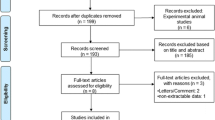Abstract
Background/Objectives
Patients with congestive heart failure (CHF) have a high prevalence of cognitive impairment and the association is multifactorial. In general, the burden of anticholinergic drugs has consistently been shown to be a risk factor for cognitive impairment in the elderly. The aim of this study was to assess the cognitive burden of medications in patients with CHF.
Design
This was a cross-sectional, retrospective, single-center study.
Setting
The study was conducted in an outpatient setting.
Participants
Patients who presented to a comprehensive heart failure clinic during a 1-month period were included.
Measurements
The primary outcomes of interest were mean anticholinergic cognitive burden (ACB) score of all medications and CHF medications (ACB-CHF), calculated based on the ACB Scoring Scale (ACB-SS). The ACB-CHF score was further dichotomized as 0 or 1 (low anticholinergic burden) versus 2 or 3 (high anticholinergic burden).
Results
A total of 182 patients were included. The mean ACB and ACB-CHF scores were 2.4 (range 0–13) and 1.0 (range 0–4), respectively, while 25.8 % of patients had an ACB-CHF score of 2 or 3. There was no association found between ejection fraction in patients with systolic heart failure and the ACB (p = 0.28) or ACB-CHF (p = 0.62) score.
Conclusion
We conclude that patients with CHF have a substantial exposure to anticholinergic medications with adverse cognitive effects. This may be another important contributor to the increased prevalence of cognitive impairment in these patients.
Similar content being viewed by others
References
Vogels RL, Scheltens P, Schroeder-Tanka JM, et al. Cognitive impairment in heart failure: a systematic review of the literature. Eur J Heart Fail. 2007;9(5):440–9.
Heckman GA, Patterson CJ, Demers C, et al. Heart failure and cognitive impairment: challenges and opportunities. Clin Interv Aging. 2007;2(2):209–18.
Bauer LC, Johnson JK, Pozehl BJ. Cognition in heart failure: an overview of the concepts and their measures. J Am Acad Nurse Pract. 2011;23(11):577–85.
Sauve MJ, Lewis WR, Blankenbiller M, et al. Cognitive impairments in chronic heart failure: a case controlled study. J Card Fail. 2009;15(1):1–10.
Gaviria M, Pliskin N, Kney A. Cognitive impairment in patients with advanced heart failure and its implications on decision-making capacity. Congest Heart Fail. 2011;17(4):175–9.
Cameron J, Worrall-Carter L, Page K, et al. Does cognitive impairment predict poor self-care in patients with heart failure? Eur J Heart Fail. 2010;12(5):508–15.
Foster ER, Cunnane KB, Edwards DF, et al. Executive dysfunction and depressive symptoms associated with reduced participation of people with severe congestive heart failure. Am J Occup Ther. 2011;65(3):306–13.
Hoth KF, Poppas A, Moser DJ, et al. Cardiac dysfunction and cognition in older adults with heart failure. Cogn Behav Neurol. 2008;21(2):65–72.
Zuccala G, Marzetti E, Cesari M, et al. Correlates of cognitive impairment among patients with heart failure: results of a multicenter survey. Am J Med. 2005;118(5):496–502.
Kindermann I, Fischer D, Karbach J, et al. Cognitive function in patients with decompensated heart failure: the Cognitive Impairment in Heart Failure (CogImpair-HF) study. Eur J Heart Fail. 2012;14(4):404–13.
Tune L, Carr S, Cooper T, et al. Association of anticholinergic activity of prescribed medications with postoperative delirium. J Neuropsychiatry Clin Neurosci. 1993;5(2):208–10.
Antonelli Incalzi R, Trojano L, Acanfora D, et al. Verbal memory impairment in congestive heart failure. J Clin Exp Neuropsychol. 2003;25(1):14–23.
Keller S, Frishman WH. Neuropsychiatric effects of cardiovascular drug therapy. Cardiol Rev. 2003;11(2):73–93.
Tune LE. Anticholinergic effects of medication in elderly patients. J Clin Psychiatry. 2001;62(Suppl 21):11–4.
Campbell N, Boustani M, Limbil T, et al. The cognitive impact of anticholinergics: a clinical review. Clin Interv Aging. 2009;4:225–33.
Cancelli I, Gigli GL, Piani A, et al. Drugs with anticholinergic properties as a risk factor for cognitive impairment in elderly people: a population-based study. J Clin Psychopharmacol. 2008;28(6):654–9.
Carnahan RM, Lund BC, Perry PJ, et al. The anticholinergic drug scale as a measure of drug-related anticholinergic burden: associations with serum anticholinergic activity. J Clin Pharmacol. 2006;46(12):1481–6.
Uusvaara J, Pitkala KH, Kautiainen H, et al. Association of anticholinergic drugs with hospitalization and mortality among older cardiovascular patients: a prospective study. Drugs Aging. 2011;28(2):131–8.
Boustani M, Campbell N, Munger S, et al. Impact of anticholinergics on the aging brain: a review and practical application. Aging Health. 2008;4(3):311–20.
Pasina L, Djade CD, Lucca U, et al. Association of anticholinergic burden with cognitive and functional status in a cohort of hospitalized elderly: comparison of the anticholinergic cognitive burden scale and anticholinergic risk scale: results from the REPOSI study. Drugs Aging. 2013;30(2):103–12.
Carriere I, Fourrier-Reglat A, Dartigues JF, et al. Drugs with anticholinergic properties, cognitive decline, and dementia in an elderly general population: the 3-city study. Arch Intern Med. 2009;169(14):1317–24.
Acknowledgments
I hereby affirm that everyone who contributed significantly to the study has been listed as an author.
Arslan Shaukat, Amir Habib, Kathleen A. Lane, Changyu Shen, Saba Khan, Yaron M. Hellman, Malaz Boustani, and Adnan S. Malik have no conflicts of interest to declare.
All authors contributed significantly to the study concept and design, acquisition of data, analysis and interpretation of data, and preparation of the manuscript.
There was no sponsor’s role, and no sources of funding were used to assist in the conduct of this study.
Author information
Authors and Affiliations
Corresponding authors
Rights and permissions
About this article
Cite this article
Shaukat, A., Habib, A., Lane, K.A. et al. Anticholinergic Medications: An Additional Contributor to Cognitive Impairment in the Heart Failure Population?. Drugs Aging 31, 749–754 (2014). https://doi.org/10.1007/s40266-014-0204-2
Published:
Issue Date:
DOI: https://doi.org/10.1007/s40266-014-0204-2




